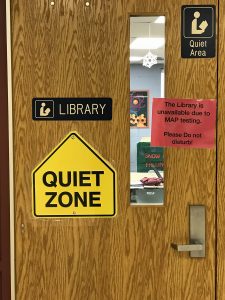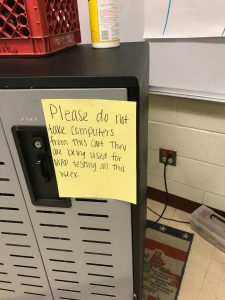Subbing in the land of free breakfasts and lunches, I accept a day’s work giving a benchmark test, AIMSWeb, in Spanish. Little children endlessly read at me all day, I mark mistakes and my life’s easy. For more on benchmark tests, go to my preceding post at eduhonesty.com.
An issue that ought to capture America’s attention is hidden behind that red sign on the door above. The sign tells students and others that the library is closed for MAP testing. That’s not strictly accurate because this latest round of MAP testing has finished. Now we have moved on to AIMSWEB. Next, we will do ACCESS testing. When will the library reopen? It should be open for a few days before we enter the ACCESS testing window.
But the library is closed. This district and this school does not have enough technology to keep the library going during testing. So here in a school whose subterranean test scores put it in the bottom of the nation’s schools, that classroom trip to the school library keeps not happening. Other volunteers with local reading programs are picking up some of the slack, but these kids desperately need to spend minutes looking through library shelves for the perfect book. They need to become enthusiastic about books — real books. Few if any of these kids have Kindles. They tend to play games when they can somehow get on line. Every reading experience is a win for America’s most academically-challenged kids.
But the library is closed and will mostly remain so until sometime a few weeks into February. These tests are not done for the year, either. MAP and AIMSWeb should return. We have to get our end of the year test scores. Oh, and there’s a big, hulking state test that takes days and days somewhere in the spring picture too. With more technology, the test could go faster, but poor districts often test in groups, class after class, because students cannot all go online at once — not enough tech and not enough tech support.
Eduhonesty: No library. No laptops either. Week after week, this will go on and kids will suffer. One fact that gets missed in this mess: This financially-impoverished district may have to shut down a variety of services, but the wealthy district where I live does not have to do the same. Where I live, they have an abundance of technology. Kids have been getting IPads to take home for years. Testing will still be disruptive in wealthier districts, but because these districts have more staff and more computers, testing causes much less disruption to learning.
Here we go again: Kicking the kids hardest who are already down.


